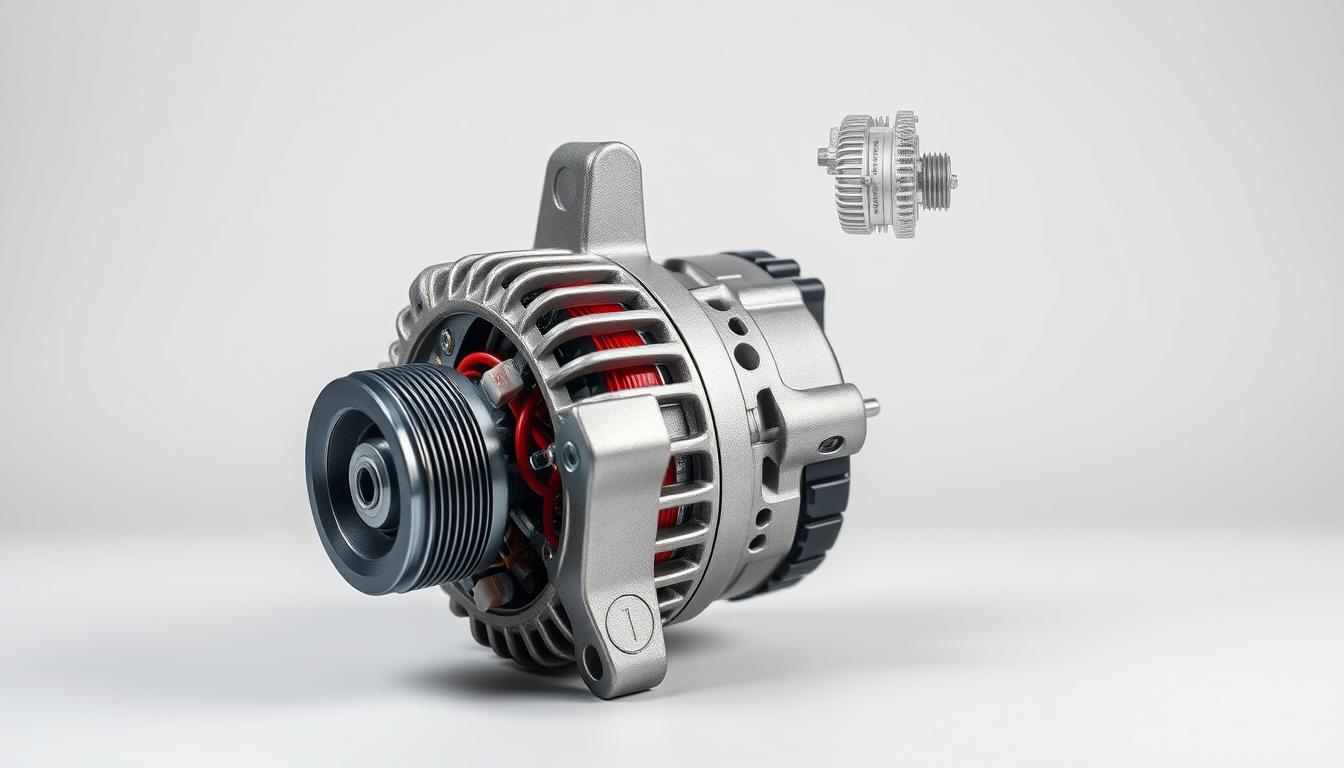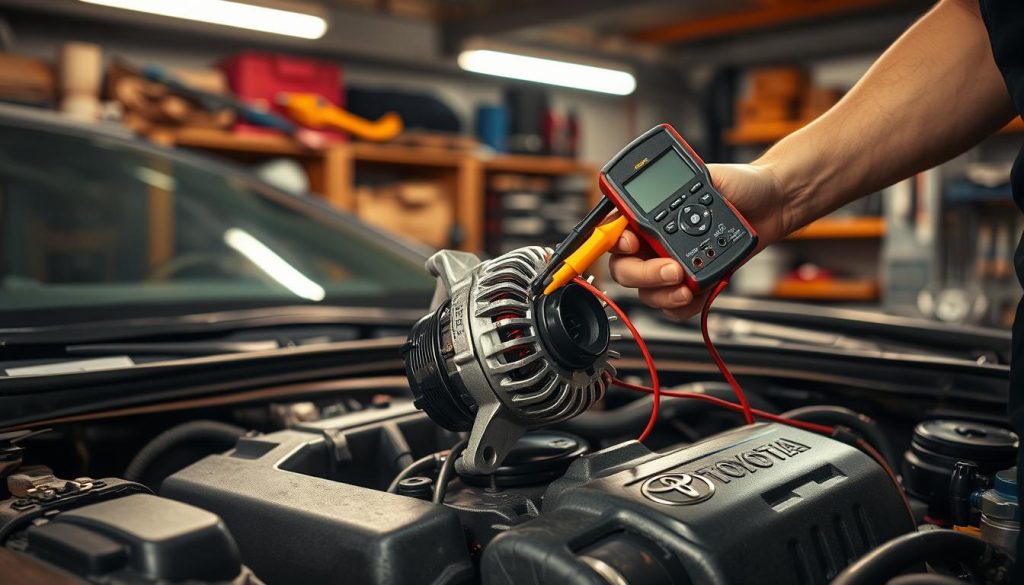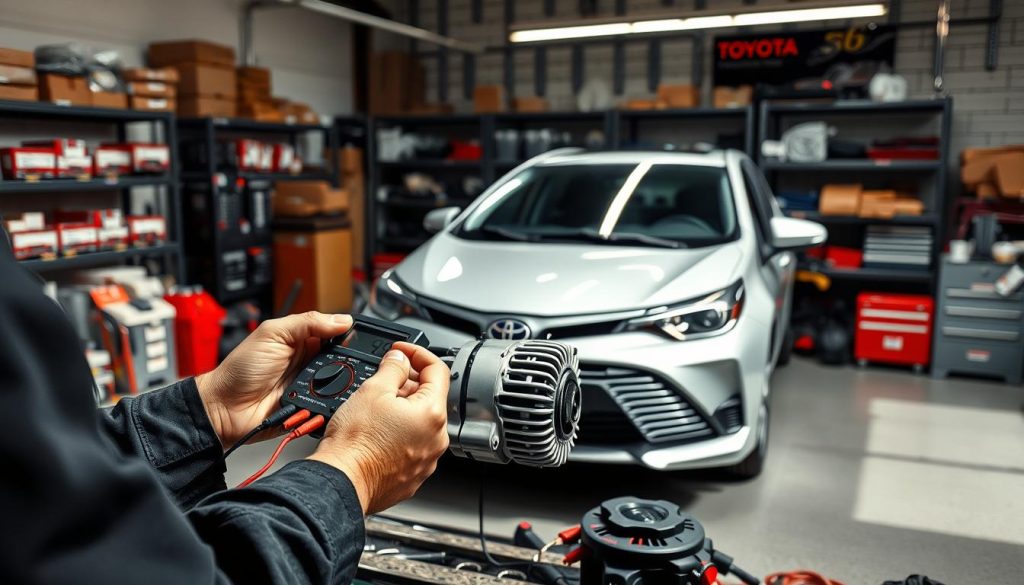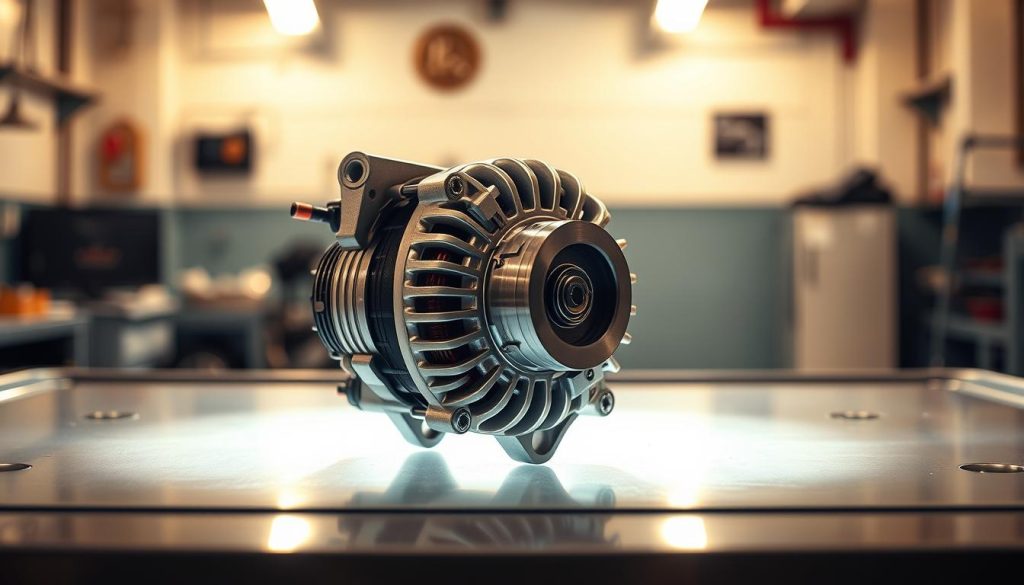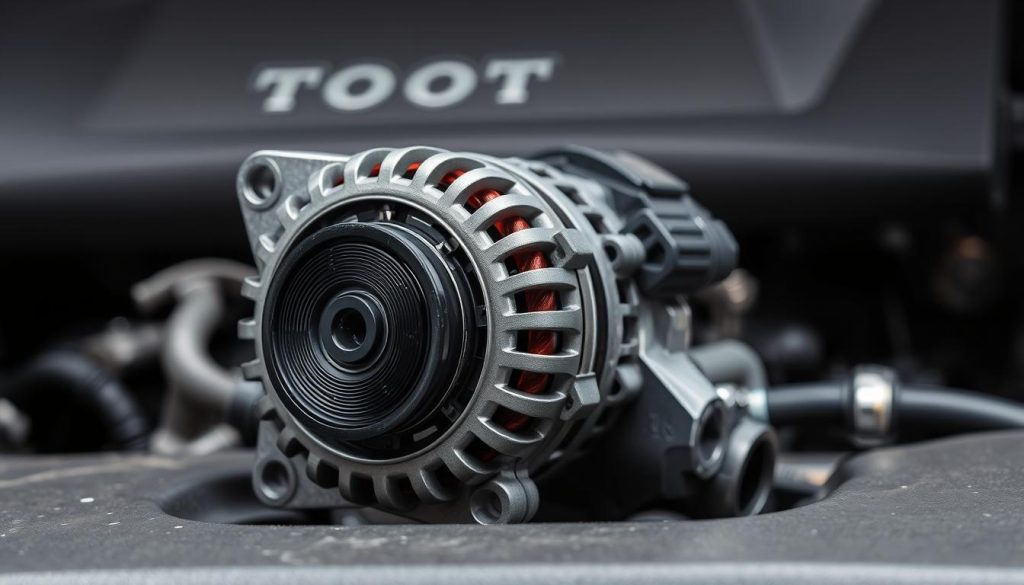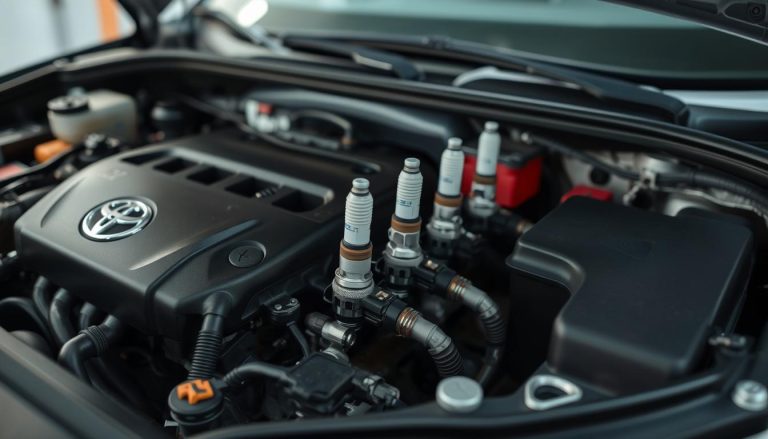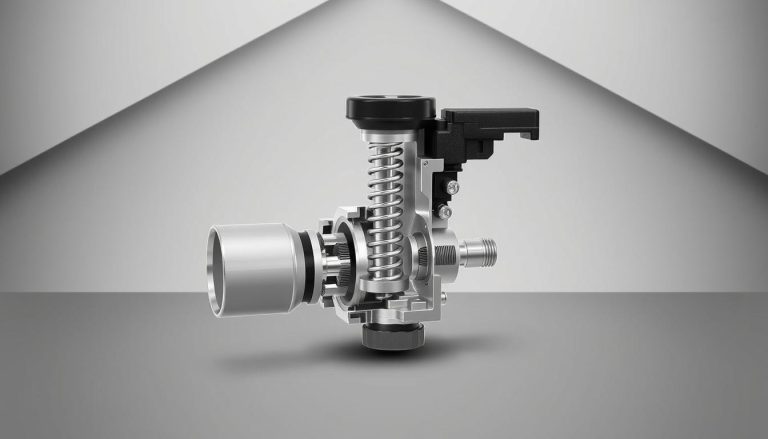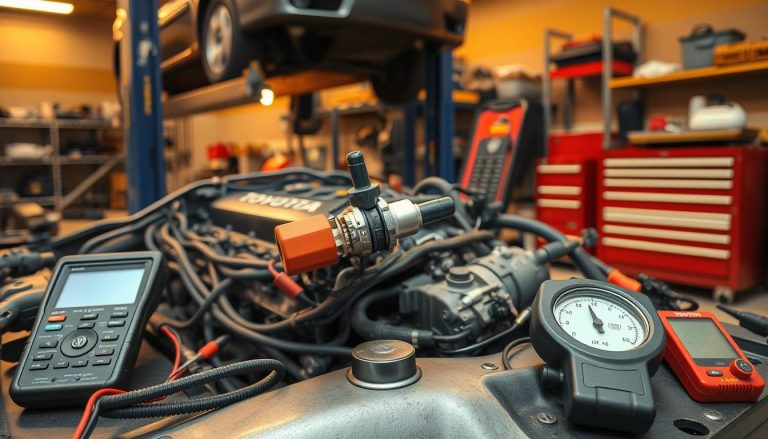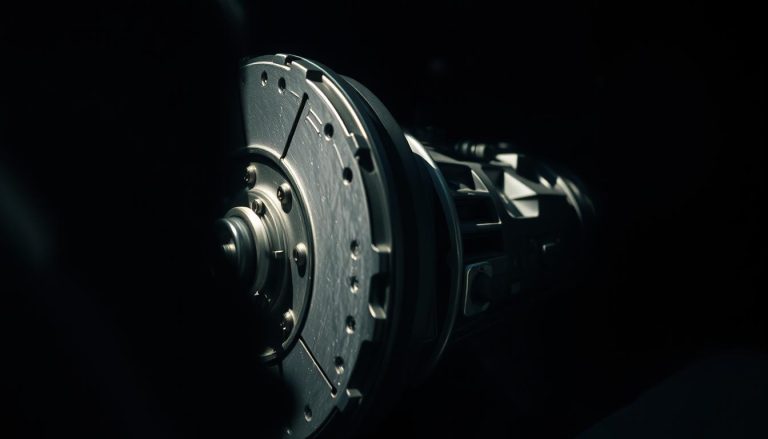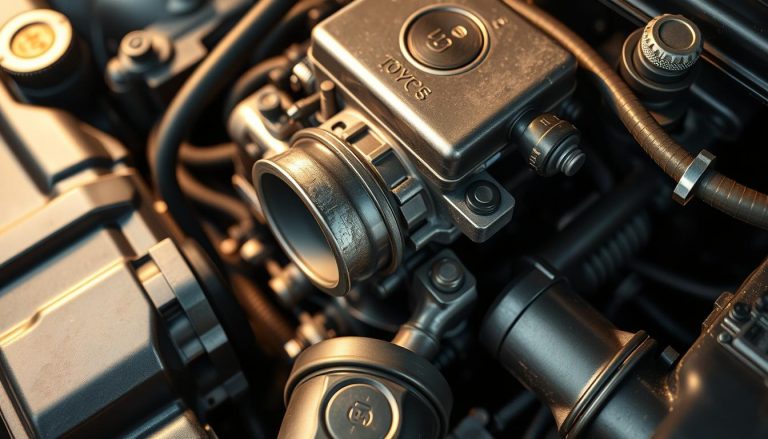Troubleshooting Toyota Alternator Problems | Guide
It’s important to know how to fix Toyota alternator issues. The alternator keeps your battery charged while driving. It powers many electrical systems in your car. If it fails, you might face electrical problems, battery drain, or even get stuck.
Understanding the Role of the Alternator
The alternator in your Toyota is key to the electrical system. It turns mechanical energy from the engine into electrical energy. This is essential for your vehicle to work right.
It keeps the battery charged. This is vital because the battery runs important systems like lights, dashboard instruments, and air conditioning. Without a good alternator, these systems won’t work, causing big problems and safety risks.
The table below shows the main alternator functions and their effect on your vehicle’s electrical system:
| Function | Impact on Electrical System |
|---|---|
| Battery Charging | Keeps the battery charged and ready to start the engine |
| Power Supply | Provides power to electrical components while the engine is running |
| Voltage Regulation | Maintains consistent voltage to protect electrical components |
Knowing how an alternator works helps spot problems early. It also shows how important this part is in your Toyota’s electrical system.
Signs of a Failing Toyota Alternator
Spotting Toyota alternator symptoms early can prevent big car electrical issues. Knowing the signs of a failing alternator is key.
Dimming or Flickering Lights
Dimming or flickering lights in your car, day or night, might mean your alternator is failing. The alternator keeps your car’s electrical systems running. If it’s not working right, it could be a sign of trouble.
Electrical Failures
Car electrical problems often come from a weak or failing alternator. You might see odd behavior in your car’s electronics. This could be slow or spotty performance, showing the alternator can’t keep up.
Battery Problems
Need to jump-start your car often or replace the battery too soon? That’s a sign of alternator trouble. A bad alternator can’t keep the battery charged, leading to quick draining and damage.
| Symptom | Potential Cause | Action to Take |
|---|---|---|
| Dimming or Flickering Lights | Weak Alternator Output | Inspect Alternator |
| Electrical Failures | Inconsistent Power Supply | Check Alternator Performance |
| Battery Problems | Insufficient Charging | Test Battery & Alternator |
Common Toyota Alternator Problems
Toyota cars with alternator issues show several warning signs. Spotting these early can avoid bigger problems and expensive fixes.
Intermittent Electrical Issues
Intermittent car issues are a key sign of a failing alternator. You might see power problems in lights, radios, or windows. These issues pop up randomly and can be hard to find without the right tools.
Persistent Warning Lights
Toyota dashboard warning lights are another important clue. When the alternator starts to fail, it may turn on warning lights like the battery or check engine light. These lights are serious and mean there’s a problem with the electrical system.
Difficulty Starting the Vehicle
Alternator failure often leads to starting problems Toyota cars have. A weak alternator can’t charge the battery well. This makes the engine start slowly or not at all. Checking the alternator regularly can help prevent these issues.
| Common Issue | Causes | Solutions |
|---|---|---|
| Intermittent Electrical Issues | Fluctuating power in vehicle systems | Test and replace the alternator if necessary |
| Persistent Warning Lights | Failure of the alternator to regulate voltage | Inspect and diagnose using an OBD-II scanner |
| Difficulty Starting the Vehicle | Battery not receiving adequate charge | Regular alternator maintenance and timely replacement |
Diagnosing Toyota Alternator Issues
It’s important to diagnose Toyota alternator issues to keep your car running well. To do this, you need to inspect it closely and use specific methods to find any problems. Start by checking the alternator’s voltage with a multimeter. It should show between 13.5 to 14.5 volts when the engine is on.
Also, look for signs of wear or damage, like frayed wires or corroded connections. Sometimes, you can spot obvious issues just by looking. If you’re not sure, the Toyota service guide can help.
Another key step is to do a thorough vehicle alternator test. This involves running the car under different loads and RPMs to see if the alternator keeps the right voltage. It’s best to have a pro do this test to get accurate results.
For the best results, consider a detailed professional inspection as part of the Toyota service guide. By following these steps, you can find and fix alternator problems. This will make sure your car runs smoothly.
Toyota Charging System Issues
The Toyota charging system is key to your car’s dependability. It keeps the battery charged while you drive. This system includes the alternator, battery, and wiring. If you notice dimming lights or dead batteries, it might need repair.
Worn-out cables or bad connections can cause problems. These issues stop the alternator from charging the battery right. Keeping everything in good shape is vital for efficient charging.
Regular checks and quick fixes can stop small issues from getting worse. This saves you from big, costly repairs later on.
To tackle problems well:
- Look for wear on the alternator.
- Check the battery connections often.
- Test the whole charging system now and then.
By taking care of your Toyota’s charging parts, you keep your car running smoothly. This avoids sudden breakdowns and costly fixes.
DIY Toyota Alternator Repair Tips
Fixing your Toyota alternator at home can save you money if you know what you’re doing. First, make sure the engine is off to stay safe. A key home car repair tip is to check and tighten belt tensions. Loose belts can make the alternator work less efficiently.
Replacing old belts is also important in DIY alternator repair. Belts wear out over time, which can hurt the alternator’s ability to charge the battery. Look for signs of wear on the belts and replace them if needed. Make sure you get the right belt size for your Toyota to avoid problems.
Cleaning terminals and connections is also critical for good performance. Dirt or corrosion can block the electrical flow, leading to charging issues. Use a wire brush or terminal cleaner to clean the terminals and connections. Make sure all connections are tight and secure for a smooth electrical flow.
By focusing on these areas, you can fix your Toyota alternator and keep your car’s charging system running well.
###
Signs Your Toyota Alternator Needs Replacement
Keeping your Toyota in top shape means knowing when to fix key parts. Spotting the signs to replace the alternator can avoid big problems later. Let’s look at important signs that your Toyota alternator might need a new one.
Strange Noises from the Engine
One clear sign to replace the alternator is hearing odd sounds from the engine. These sounds can be grinding or whining, showing that parts inside might be breaking down. Not fixing these sounds can cause more damage and expensive fixes.
Smell of Burning Rubber
Another key sign is the smell of burning rubber coming from under the hood. This smell usually means belts are overheating or the alternator is failing. It’s important to act fast, as ignoring this can harm your car a lot.
Using these Toyota maintenance tips in your regular checks can catch these problems early. Knowing when to replace your Toyota alternator keeps your car running well and avoids sudden breakdowns.
How to Test Your Toyota Alternator
Testing your Toyota alternator is key to keeping your car’s charging system in top shape. You’ll need a multimeter or an alternator tester to do this. These tools help measure the voltage and check the alternator’s condition.
Here’s a simple guide to test your alternator:
- Step 1: Preparation – Park your car on a flat surface and turn off the engine. Open the hood and find the alternator.
- Step 2: Setting Up the Multimeter – Set your multimeter to DC voltage. Connect the red lead to the battery’s positive terminal and the black lead to the negative terminal.
- Step 3: Starting the Engine – Start your car and let it idle. Watch the multimeter reading. A good alternator shows a voltage between 13.5V to 14.8V.
- Step 4: Load Testing – Turn on your headlights, radio, and other accessories. The voltage should stay above 13V. If it falls below, your alternator might be under too much stress.
- Step 5: Final Check – Turn off the engine and remove the multimeter leads. Record your readings. If they’re off, it’s best to get a professional’s help.
This alternator test guide is easy to follow at home as part of your car’s maintenance. But, if you’re unsure, it’s smart to have a mechanic check it for you.
Troubleshooting Toyota Alternator Problems
To keep your Toyota running well, it’s key to fix alternator issues. You should check the alternator often and use top-notch diagnostic tools. This ensures your car runs smoothly.
Performing a Visual Inspection
Begin with a detailed look. Check the alternator for wear signs like frayed belts or corrosion. This can spot problems that affect your car’s performance.
Using Advanced Diagnostic Tools
After the visual check, use advanced tools to dig deeper. These tools measure the alternator’s electrical output and efficiency. Regular use helps your alternator last longer and keeps your car running great.
Toyota Alternator Warranty Issues
Understanding the Toyota alternator warranty is key to keeping your car running well. This part explains the warranty’s main points. It helps you deal with any problems easily.
Knowing what the Toyota alternator warranty covers is vital. It usually lasts for a certain time or miles. It protects against defects in materials or workmanship.
- Warranty Period: The warranty for a Toyota alternator can last from 3 years or 36,000 miles to longer for some models.
- Covered Components: The warranty includes the alternator and other electrical parts.
- Claim Process: To use the alternator replacement warranty, you must visit an authorized Toyota dealership for inspection and service.
To get the details for your model, check the owner’s manual or talk to your local dealer. If a problem comes up, knowing how to claim under the warranty can save you money and time.
| Warranty Aspect | Details |
|---|---|
| Duration | 3 years/36,000 miles or more |
| Covered Components | Alternator, Electrical Parts |
| Claim Process | Inspection at Authorized Dealership |
Remembering this car warranty info helps you use your Toyota’s alternator warranty wisely. It ensures your car’s maintenance is smooth and trouble-free.
Professional Toyota Alternator Repair Services
Professional alternator repair services are key to keeping your Toyota running smoothly. They use special tools and know-how to fix or replace bad alternators. This makes sure your car meets Toyota’s top standards.
Choosing a Toyota certified repair service means your car is in good hands. These experts know all about Toyota’s design and how it works. They use real Toyota parts and follow strict rules to fix alternator problems. This keeps your car running longer and its value higher.
Here are some benefits of using Toyota certified repair services for alternator issues:
- Access to genuine Toyota parts and advanced diagnostic tools.
- Technicians trained in Toyota automotive repair services.
- Guarantee your vehicle meets Toyota’s high quality and safety standards.
- Professional alternator repair done with care and precision.
Using professional Toyota alternator repair services ensures your car’s charging system works well. These services are reliable and efficient, making them a great choice for any Toyota owner.
Preventative Maintenance for Toyota Alternators
Keeping your Toyota’s alternator in top shape is key for your car’s long life and reliability. Regular checks are vital for Toyota care. They include looking at the alternator’s belt for wear and making sure it’s the right tension.
It’s also important to check that all electrical connections to the alternator are tight and free from rust. Rusty connections can cause problems and even fail. Adding these simple steps to your routine can make your Toyota’s alternator last longer.
Also, listen to your car for any odd sounds or signs. Spotting issues early can save you from big, expensive repairs later. By following these care tips, you’ll enjoy a smooth and reliable drive.
Toyota Alternator Replacement Costs
Knowing the cost of replacing a Toyota alternator is key when planning car repairs. The price can change based on the Toyota model and the type of part used. OEM parts are pricier but ensure perfect fit and reliability.
Replacing the alternator also includes labor costs if you choose a professional mechanic. Labor fees vary by service provider. It’s smart to compare prices from different places.
Here’s a detailed breakdown to guide you:
| Factor | Cost Range |
|---|---|
| OEM Alternator | $300 – $500 |
| Aftermarket Alternator | $150 – $300 |
| Labor Costs | $100 – $200 |
| Total Replacement Cost | $250 – $700 |
Planning ahead for car repair can save you from financial surprises. Always get quotes from several places to find the best deal. This way, you can manage the costs and avoid unexpected expenses.
Conclusion
Understanding and fixing Toyota alternator problems is key to keeping your car running well. Look out for signs like dim lights or electrical failures. These can mean your alternator is on the way out.
Regular checks can help avoid most alternator issues. Adding these to your car care routine helps catch small problems early. If bigger issues arise, getting help from a Toyota expert can solve the problem fast.
Being aware of your car’s needs is vital for its performance. This guide helps you tackle Toyota alternator problems. By being proactive, you not only keep your alternator working but also ensure your safety on the road.
FAQ
What are common signs of a failing Toyota alternator?
Signs include dimming or flickering lights, electrical issues, battery problems, and dashboard warning lights.
What role does the alternator play in a Toyota vehicle?
The alternator turns engine energy into electrical energy. It charges the battery and powers systems like lights and air conditioning.
How can I diagnose alternator problems in my Toyota?
Use a multimeter to check voltage. Look for physical damage on the alternator. A professional can do a detailed test.
What should I do if my Toyota exhibits electrical failures?
Electrical failures like erratic displays or slow windows might mean alternator issues. Get it checked quickly.
Can I perform DIY repairs on my Toyota alternator?
Yes, you can do simple repairs. Check and tighten belt tensions, replace belts, and clean terminals. Always turn off the engine first.
When should I consider replacing my Toyota alternator?
Replace it if you hear grinding or whining noises or smell burning rubber. These signs mean overheating belts or alternator failure.
How can I test my Toyota alternator at home?
Use a multimeter or alternator tester to check voltage. This shows if the alternator is charging the battery well.
What components are involved in the Toyota charging system?
The system includes the alternator, battery, and wiring. Problems can come from worn cables, faulty connections, or a bad alternator.
How do I navigate warranty issues for my Toyota alternator?
Know your warranty terms, what it covers, and how to make a claim. Check with your dealer or warranty documents for details.
Why are professional Toyota alternator repair services recommended?
Pros have the skills and tools for quick, accurate repairs. They ensure your alternator works right, meeting Toyota’s standards.
What preventative maintenance can prolong the life of my Toyota alternator?
Regular checks, proper belt adjustments, and good electrical connections help. They prevent early failures and extend your alternator’s life.
What is the cost of replacing a Toyota alternator?
Costs vary by model and part type. Labor adds to the price. Shop around to find the best deal.

